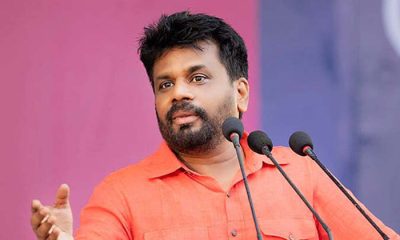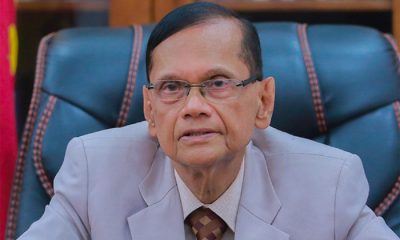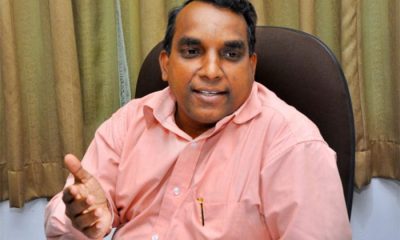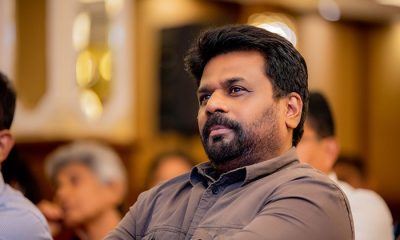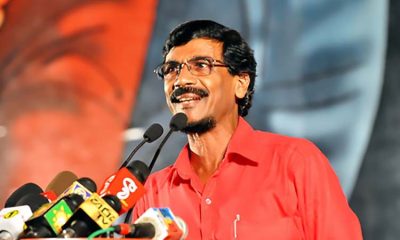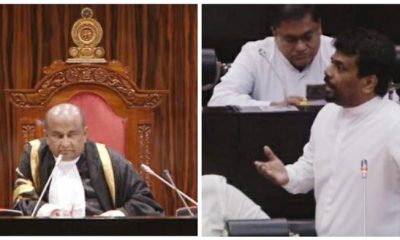Features
The Election-Economy Nexus and the Politics of JVP Apology
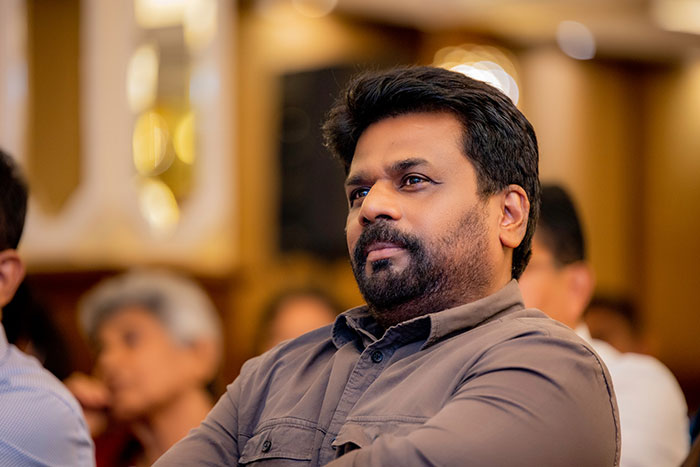
by Rajan Philips
The economy is the base; everything else is superstructure. That is the old Marxian concept, simply put. The base ultimately determines what goes on in the superstructure, which includes among other things the state and its institutions, as well as their processes and functions. Included are the legislature, the executive and the judiciary, and their elections and appointments. Over time, there have been modifications to the old concept.
Borrowing from Freud’s psychoanalysis, Louis Althusser, the French Marxist, used the concept of over-determination to suggest that there are multiple causes producing an effect, i.e., political outcomes are ‘over determined’ by many causes besides the economy, although the economy could be singularly significant. Neo-Marxists have provided another angle in that just as the base could determine the goings on in the superstructure, what goes on in the superstructure also have implications for the base.
I believe it was in his political obituary of JR Jayewardene (in the Lanka Guardian) that Dayan Jayatilleke quite remarkably described the outcome of JRJ’s open economy project was to drag the Sri Lankan economic base into alignment with the superstructure that had already drifted into alignment with global changes. This is not to absolve the architects of the open economy of their untoward intentions, unintended results and ill-gotten gains, but to use that experience as a backdrop as we come to view the emerging dialectic between the economy of Sri Lanka and the politics of the JVP/NPP. And in this election year, all politics is electoral. Hence the election-economy nexus.
Yet the JVP’s project is quite different from that of JRJ. The task is now to salvage the economy and not to embark on any realignment. For the electorate it would be a question of JVP’s competence as much it would be of its attractiveness as a new alternative. So, it is fair, reasonable and necessary to question the JVP/NPP on its approach to and experience in matters economic.
But it is a worthless red herring to demand the present leader of the JVP/NPP to apologize for the doings and misdoings of the pre-NPP JVP under the leadership of his predecessors. Put another way, if the JVP/NPP were to win the next pair of national elections, it should be because it is able to persuade a majority of voters on what it can do in the future as government, especially for providing economic stewardship; and not because it says sorry for what the JVP did in its insurrectionary past under a different leadership.
Schoolmasterly Politics
It is also school masterly politics to ask Anura Kumara Dissanayake to say sorry for the ways of his predecessors before he can be admitted in class. Not to mention the preferential school masterly treatment in allowing convicted murders to sit in parliament because they belong to the right parties and perhaps the same ‘class.’ It is not my purpose to prescribe what Mr. Dissanayake should or should not do or to predict what he may or may not do, but to critique, if not poke fun at, the moral hypocrisy and the political idiocy of the current crop of apology seekers.
Globally, there is a body of literature on political apologies following the so called “age of apologies” – the two decades of 1990s and 2000s, when 186 political apologies were rendered in comparison to 16 apologies over the previous four decades from 1947 to 1989. Decolonization obviously provided the primary site for rendering political apologies. Other instances include oppressive states and regimes using apologies as a framework for reconciliation and restorative justice between state oppressors and the oppressed populations. The most celebrated example of the latter is the truth and reconciliation experience of post-apartheid South Africa.
The offering of apologies is still continuing and in significant numbers, but a number of apology academics are becoming weary of dispensing apology by state actors who cynically use apologies to rhetorically accept responsibility without institutional commitment to change. The ethos of apology is now credited for the American response to the 9/11 Al Qaeda attacks that targeted the perpetrators of the attack while rejecting Islamophobia and without infringing the rights and freedoms of Muslim and Arab American citizens. Bundling Al Qaeda and Islam is the handiwork of Donald Trump, but that is an altogether different phenomenon.
Germany has perpetually placed itself in apology mode for the horrors of the holocaust. But where continuing restitution for even such an epochal tragedy as the holocaust can easily morph into a new and subjectively no less horrific tragedy is what the world is now watching in Gaza. The political fallouts from the Gaza tragedy are manifesting themselves in every Western country. To wit, the historic trouncing of all the major political parties in the recent Rochdale bye-election in Britain. Not to mention the domestic pressure on the Biden Administration in the US and its desperate efforts to effect an immediate ceasefire in Gaza while insisting on the two-state solution for the long term. Be that as it may.
Sri Lanka is not an automatic site for political apologies. Some Western academics have noted that Sri Lanka is not the typical authoritarian state that is transitioning to democracy, with political apologies becoming part of the transitionary phase. Sri Lanka, if at all, has been moving in the opposite direction. A reasonably functioning democratic state that has been more than occasionally careening into authoritarian spells. One significant shortcoming that academics have noted is the absence of judicial review of legislation that have prolonged the life of draconian laws without checks and challenges. There is homework to be done in putting these checks and balances in place through constitutional reform. But nothing is going to come out of asking for and accepting apologies.
Historically, the oppressive instruments of the state have been used against working class organizations and minority groups. No apology was given, and nothing was asked for. The 1971 JVP insurrection was the first instance when the state was systematically challenged and forced into an authoritarian mode. The insurrection was defeated, and its leaders were tried under new laws, convicted and jailed. No one asked for apologies. There were of course significant political fallout. The whole program of the United Front government was irreparably set back. The brutal put down of the insurrection by the UF government became an electoral weapon for the opposition UNP in the 1977 elections. The UNP’s payback was the freeing of imprisoned JVP leaders, not all of whom were ready to grow out of their insurrectionist proclivities.
1983 came and went without any apology, and in an aside President Jayewardene declared the JVP Naxalites, and ordered their arrests. The JVP went underground to launch its second coming, and it came with worse brutalities and matching putdowns. The JVP was again defeated to a point that its third coming could only be non-violent and even democratic. Should President Jayewardene be asked for a posthumous apology – for triggering the cycle of JVP violence – now that there is a kinsman of his in office as President?
At the other side of the ethno-spectrum, the Tamil militants engaged the state in bouts of war that went on for over 25 years. Even the Indian army got in the act, and the whole island became a killing field. People perished in their random tens of thousands. There have also been hundreds of targeted killings, including a dozen or so emblematic ones using state resources for political reasons as well as for personal reasons. None of them have been solved and the perpetrators are perpetually at large. In the scheme of things, who is one to ask for apologies and who is to give?
What might be more concerning is the reported mobilization of ‘retired tri-forces’ by the JVP/NPP apparently as an electoral phalanx. The SJB is reportedly going after officer-level retirees, while Ranil Wickremesinghe has staked his ground from top, as usual, by taking care of the current tri-forces with state bounties. The tri-forces, whether on the job or in retirement, have become an important part of the Sinhalese social formation, as well as a numerically critical voting bloc.
The socialization of the tri-forces has served the positive purpose of keeping them away from temptations to overthrow democratically elected governments. But the ever lurking danger is in the ethno-politicization of the tri-forces that pits them against non-Sinhala members of the Sri Lankan society. The Rajapaksas were often accused of ethno-politicization of not just the tri-forces, but of all forces. Even that did not help them in the end, a lesson that the JVP/NPP can ignore only at their ultimate peril.
The Election-Economy Nexus
Turning to the elections and the economy, Sri Lanka is among quite a few countries that are facing rather consequential elections this year. But there is no consistent picture of the election-economy nexus that one might see in the countries with upcoming elections. Understandably so, because beneath the over arch of the global economy, the world’s societies are seething with their socio political specificities. The two big ones are India and the US. The Indian economy is strong. It is the economic engine that is propelling South Asia to be the leading growth region in a somewhat sluggish world economy. The world economy is “neither sick nor strong” is the assessment of a political economist, John Rapley. He even compares it to long Covid – the lasting aftereffects of Covid-19 that selectively impairs some but not others.
India struggled during the pandemic, but now it is surging. India’s growth has been upwards of 7% and 8% in recent quarters and is projected keep going for now. In comparison to others, India’s manufacturing sector is sustainably strong. Modi inspired government spending on infrastructure and incentives to boost the production of electrical and electronic goods have been positively catalytic. He is poised to win a ‘threepeat’ election victory, which he could have done on the strength of performance of the economic base alone without monkeying with India’s secular superstructure.
China, on the other hand, is literally on a downward trajectory. The country does not suffer elections, but it is currently suffering the drastic reversal of its once runaway economic growth. So much bad news, that the government canceled Premier Li Qiang’s news conference that traditionally accompanies the annual sessions of the National People’s Congress.
At the other end, the US economy is going strong; in fact, the only western economy that is positively growing in every sector. Britain and Japan are officially in recession, and Germany is reportedly at economic ‘standstill.’ President Biden delivered his election year State of the Union address on Thursday. He ripped into Trump; chided the Justices of the Supreme Court who were in attendance for rescinding women’s right to abortion; called upon women to show their power with their vote; and joked that he may not look old, but he has been around for a long time.
It was quite a performance at the pulpit for an 81 year old, with hardly any stumble. It certainly would enthuse his base, but whether it would be enough to stop Trump in his tracks is a different question. The November election will be a repeat of the last one between Biden and Trump with their positions reversed. But Biden is not ahead of Trump in opinion polls, as he should be on account of the economy alone. That base is not helping Biden, at least not yet.
On the other hand, Trump who should be reviled and rejected for orchestrating an insurrection against the Congress on January 6, 2021, among other crimes, has taken over the Republican Party, the party of Abraham Lincoln. No one has asked him to apologize. The state of American superstructure is quite shaky in spite of its strong economic base.
There is not much to say that is not already known about either Sri Lanka’s economy or its politics. The assurances of the two elections happening, starting this year, have given room for some optimism and hope. The arrival of Anura Kumara Dissanayake as a presidential contender has spurred the public mood. But it is still a long way to go. And there will be many questions asked of Mr. Dissanayake, and rightly so. Let them be questions on the economy, on ending crime and corruption, and on constitutional reform. Not about apologies.
Features
The heart-friendly health minister

by Dr Gotabhya Ranasinghe
Senior Consultant Cardiologist
National Hospital Sri Lanka
When we sought a meeting with Hon Dr. Ramesh Pathirana, Minister of Health, he graciously cleared his busy schedule to accommodate us. Renowned for his attentive listening and deep understanding, Minister Pathirana is dedicated to advancing the health sector. His openness and transparency exemplify the qualities of an exemplary politician and minister.
Dr. Palitha Mahipala, the current Health Secretary, demonstrates both commendable enthusiasm and unwavering support. This combination of attributes makes him a highly compatible colleague for the esteemed Minister of Health.
Our discussion centered on a project that has been in the works for the past 30 years, one that no other minister had managed to advance.
Minister Pathirana, however, recognized the project’s significance and its potential to revolutionize care for heart patients.
The project involves the construction of a state-of-the-art facility at the premises of the National Hospital Colombo. The project’s location within the premises of the National Hospital underscores its importance and relevance to the healthcare infrastructure of the nation.
This facility will include a cardiology building and a tertiary care center, equipped with the latest technology to handle and treat all types of heart-related conditions and surgeries.
Securing funding was a major milestone for this initiative. Minister Pathirana successfully obtained approval for a $40 billion loan from the Asian Development Bank. With the funding in place, the foundation stone is scheduled to be laid in September this year, and construction will begin in January 2025.
This project guarantees a consistent and uninterrupted supply of stents and related medications for heart patients. As a result, patients will have timely access to essential medical supplies during their treatment and recovery. By securing these critical resources, the project aims to enhance patient outcomes, minimize treatment delays, and maintain the highest standards of cardiac care.
Upon its fruition, this monumental building will serve as a beacon of hope and healing, symbolizing the unwavering dedication to improving patient outcomes and fostering a healthier society.We anticipate a future marked by significant progress and positive outcomes in Sri Lanka’s cardiovascular treatment landscape within the foreseeable timeframe.
Features
A LOVING TRIBUTE TO JESUIT FR. ALOYSIUS PIERIS ON HIS 90th BIRTHDAY

by Fr. Emmanuel Fernando, OMI
Jesuit Fr. Aloysius Pieris (affectionately called Fr. Aloy) celebrated his 90th birthday on April 9, 2024 and I, as the editor of our Oblate Journal, THE MISSIONARY OBLATE had gone to press by that time. Immediately I decided to publish an article, appreciating the untiring selfless services he continues to offer for inter-Faith dialogue, the renewal of the Catholic Church, his concern for the poor and the suffering Sri Lankan masses and to me, the present writer.
It was in 1988, when I was appointed Director of the Oblate Scholastics at Ampitiya by the then Oblate Provincial Fr. Anselm Silva, that I came to know Fr. Aloy more closely. Knowing well his expertise in matters spiritual, theological, Indological and pastoral, and with the collaborative spirit of my companion-formators, our Oblate Scholastics were sent to Tulana, the Research and Encounter Centre, Kelaniya, of which he is the Founder-Director, for ‘exposure-programmes’ on matters spiritual, biblical, theological and pastoral. Some of these dimensions according to my view and that of my companion-formators, were not available at the National Seminary, Ampitiya.
Ever since that time, our Oblate formators/ accompaniers at the Oblate Scholasticate, Ampitiya , have continued to send our Oblate Scholastics to Tulana Centre for deepening their insights and convictions regarding matters needed to serve the people in today’s context. Fr. Aloy also had tried very enthusiastically with the Oblate team headed by Frs. Oswald Firth and Clement Waidyasekara to begin a Theologate, directed by the Religious Congregations in Sri Lanka, for the contextual formation/ accompaniment of their members. It should very well be a desired goal of the Leaders / Provincials of the Religious Congregations.
Besides being a formator/accompanier at the Oblate Scholasticate, I was entrusted also with the task of editing and publishing our Oblate journal, ‘The Missionary Oblate’. To maintain the quality of the journal I continue to depend on Fr. Aloy for his thought-provoking and stimulating articles on Biblical Spirituality, Biblical Theology and Ecclesiology. I am very grateful to him for his generous assistance. Of late, his writings on renewal of the Church, initiated by Pope St. John XX111 and continued by Pope Francis through the Synodal path, published in our Oblate journal, enable our readers to focus their attention also on the needed renewal in the Catholic Church in Sri Lanka. Fr. Aloy appreciated very much the Synodal path adopted by the Jesuit Pope Francis for the renewal of the Church, rooted very much on prayerful discernment. In my Religious and presbyteral life, Fr.Aloy continues to be my spiritual animator / guide and ongoing formator / acccompanier.
Fr. Aloysius Pieris, BA Hons (Lond), LPh (SHC, India), STL (PFT, Naples), PhD (SLU/VC), ThD (Tilburg), D.Ltt (KU), has been one of the eminent Asian theologians well recognized internationally and one who has lectured and held visiting chairs in many universities both in the West and in the East. Many members of Religious Congregations from Asian countries have benefited from his lectures and guidance in the East Asian Pastoral Institute (EAPI) in Manila, Philippines. He had been a Theologian consulted by the Federation of Asian Bishops’ Conferences for many years. During his professorship at the Gregorian University in Rome, he was called to be a member of a special group of advisers on other religions consulted by Pope Paul VI.
Fr. Aloy is the author of more than 30 books and well over 500 Research Papers. Some of his books and articles have been translated and published in several countries. Among those books, one can find the following: 1) The Genesis of an Asian Theology of Liberation (An Autobiographical Excursus on the Art of Theologising in Asia, 2) An Asian Theology of Liberation, 3) Providential Timeliness of Vatican 11 (a long-overdue halt to a scandalous millennium, 4) Give Vatican 11 a chance, 5) Leadership in the Church, 6) Relishing our faith in working for justice (Themes for study and discussion), 7) A Message meant mainly, not exclusively for Jesuits (Background information necessary for helping Francis renew the Church), 8) Lent in Lanka (Reflections and Resolutions, 9) Love meets wisdom (A Christian Experience of Buddhism, 10) Fire and Water 11) God’s Reign for God’s poor, 12) Our Unhiddden Agenda (How we Jesuits work, pray and form our men). He is also the Editor of two journals, Vagdevi, Journal of Religious Reflection and Dialogue, New Series.
Fr. Aloy has a BA in Pali and Sanskrit from the University of London and a Ph.D in Buddhist Philosophy from the University of Sri Lankan, Vidyodaya Campus. On Nov. 23, 2019, he was awarded the prestigious honorary Doctorate of Literature (D.Litt) by the Chancellor of the University of Kelaniya, the Most Venerable Welamitiyawe Dharmakirthi Sri Kusala Dhamma Thera.
Fr. Aloy continues to be a promoter of Gospel values and virtues. Justice as a constitutive dimension of love and social concern for the downtrodden masses are very much noted in his life and work. He had very much appreciated the commitment of the late Fr. Joseph (Joe) Fernando, the National Director of the Social and Economic Centre (SEDEC) for the poor.
In Sri Lanka, a few religious Congregations – the Good Shepherd Sisters, the Christian Brothers, the Marist Brothers and the Oblates – have invited him to animate their members especially during their Provincial Congresses, Chapters and International Conferences. The mainline Christian Churches also have sought his advice and followed his seminars. I, for one, regret very much, that the Sri Lankan authorities of the Catholic Church –today’s Hierarchy—- have not sought Fr.
Aloy’s expertise for the renewal of the Catholic Church in Sri Lanka and thus have not benefited from the immense store of wisdom and insight that he can offer to our local Church while the Sri Lankan bishops who governed the Catholic church in the immediate aftermath of the Second Vatican Council (Edmund Fernando OMI, Anthony de Saram, Leo Nanayakkara OSB, Frank Marcus Fernando, Paul Perera,) visited him and consulted him on many matters. Among the Tamil Bishops, Bishop Rayappu Joseph was keeping close contact with him and Bishop J. Deogupillai hosted him and his team visiting him after the horrible Black July massacre of Tamils.
Features
A fairy tale, success or debacle

Sri Lanka-Singapore Free Trade Agreement
By Gomi Senadhira
senadhiragomi@gmail.com
“You might tell fairy tales, but the progress of a country cannot be achieved through such narratives. A country cannot be developed by making false promises. The country moved backward because of the electoral promises made by political parties throughout time. We have witnessed that the ultimate result of this is the country becoming bankrupt. Unfortunately, many segments of the population have not come to realize this yet.” – President Ranil Wickremesinghe, 2024 Budget speech
Any Sri Lankan would agree with the above words of President Wickremesinghe on the false promises our politicians and officials make and the fairy tales they narrate which bankrupted this country. So, to understand this, let’s look at one such fairy tale with lots of false promises; Ranil Wickremesinghe’s greatest achievement in the area of international trade and investment promotion during the Yahapalana period, Sri Lanka-Singapore Free Trade Agreement (SLSFTA).
It is appropriate and timely to do it now as Finance Minister Wickremesinghe has just presented to parliament a bill on the National Policy on Economic Transformation which includes the establishment of an Office for International Trade and the Sri Lanka Institute of Economics and International Trade.
Was SLSFTA a “Cleverly negotiated Free Trade Agreement” as stated by the (former) Minister of Development Strategies and International Trade Malik Samarawickrama during the Parliamentary Debate on the SLSFTA in July 2018, or a colossal blunder covered up with lies, false promises, and fairy tales? After SLSFTA was signed there were a number of fairy tales published on this agreement by the Ministry of Development Strategies and International, Institute of Policy Studies, and others.
However, for this article, I would like to limit my comments to the speech by Minister Samarawickrama during the Parliamentary Debate, and the two most important areas in the agreement which were covered up with lies, fairy tales, and false promises, namely: revenue loss for Sri Lanka and Investment from Singapore. On the other important area, “Waste products dumping” I do not want to comment here as I have written extensively on the issue.
1. The revenue loss
During the Parliamentary Debate in July 2018, Minister Samarawickrama stated “…. let me reiterate that this FTA with Singapore has been very cleverly negotiated by us…. The liberalisation programme under this FTA has been carefully designed to have the least impact on domestic industry and revenue collection. We have included all revenue sensitive items in the negative list of items which will not be subject to removal of tariff. Therefore, 97.8% revenue from Customs duty is protected. Our tariff liberalisation will take place over a period of 12-15 years! In fact, the revenue earned through tariffs on goods imported from Singapore last year was Rs. 35 billion.
The revenue loss for over the next 15 years due to the FTA is only Rs. 733 million– which when annualised, on average, is just Rs. 51 million. That is just 0.14% per year! So anyone who claims the Singapore FTA causes revenue loss to the Government cannot do basic arithmetic! Mr. Speaker, in conclusion, I call on my fellow members of this House – don’t mislead the public with baseless criticism that is not grounded in facts. Don’t look at petty politics and use these issues for your own political survival.”
I was surprised to read the minister’s speech because an article published in January 2018 in “The Straits Times“, based on information released by the Singaporean Negotiators stated, “…. With the FTA, tariff savings for Singapore exports are estimated to hit $10 million annually“.
As the annual tariff savings (that is the revenue loss for Sri Lanka) calculated by the Singaporean Negotiators, Singaporean $ 10 million (Sri Lankan rupees 1,200 million in 2018) was way above the rupees’ 733 million revenue loss for 15 years estimated by the Sri Lankan negotiators, it was clear to any observer that one of the parties to the agreement had not done the basic arithmetic!
Six years later, according to a report published by “The Morning” newspaper, speaking at the Committee on Public Finance (COPF) on 7th May 2024, Mr Samarawickrama’s chief trade negotiator K.J. Weerasinghehad had admitted “…. that forecasted revenue loss for the Government of Sri Lanka through the Singapore FTA is Rs. 450 million in 2023 and Rs. 1.3 billion in 2024.”
If these numbers are correct, as tariff liberalisation under the SLSFTA has just started, we will pass Rs 2 billion very soon. Then, the question is how Sri Lanka’s trade negotiators made such a colossal blunder. Didn’t they do their basic arithmetic? If they didn’t know how to do basic arithmetic they should have at least done their basic readings. For example, the headline of the article published in The Straits Times in January 2018 was “Singapore, Sri Lanka sign FTA, annual savings of $10m expected”.
Anyway, as Sri Lanka’s chief negotiator reiterated at the COPF meeting that “…. since 99% of the tariffs in Singapore have zero rates of duty, Sri Lanka has agreed on 80% tariff liberalisation over a period of 15 years while expecting Singapore investments to address the imbalance in trade,” let’s turn towards investment.
Investment from Singapore
In July 2018, speaking during the Parliamentary Debate on the FTA this is what Minister Malik Samarawickrama stated on investment from Singapore, “Already, thanks to this FTA, in just the past two-and-a-half months since the agreement came into effect we have received a proposal from Singapore for investment amounting to $ 14.8 billion in an oil refinery for export of petroleum products. In addition, we have proposals for a steel manufacturing plant for exports ($ 1 billion investment), flour milling plant ($ 50 million), sugar refinery ($ 200 million). This adds up to more than $ 16.05 billion in the pipeline on these projects alone.
And all of these projects will create thousands of more jobs for our people. In principle approval has already been granted by the BOI and the investors are awaiting the release of land the environmental approvals to commence the project.
I request the Opposition and those with vested interests to change their narrow-minded thinking and join us to develop our country. We must always look at what is best for the whole community, not just the few who may oppose. We owe it to our people to courageously take decisions that will change their lives for the better.”
According to the media report I quoted earlier, speaking at the Committee on Public Finance (COPF) Chief Negotiator Weerasinghe has admitted that Sri Lanka was not happy with overall Singapore investments that have come in the past few years in return for the trade liberalisation under the Singapore-Sri Lanka Free Trade Agreement. He has added that between 2021 and 2023 the total investment from Singapore had been around $162 million!
What happened to those projects worth $16 billion negotiated, thanks to the SLSFTA, in just the two-and-a-half months after the agreement came into effect and approved by the BOI? I do not know about the steel manufacturing plant for exports ($ 1 billion investment), flour milling plant ($ 50 million) and sugar refinery ($ 200 million).
However, story of the multibillion-dollar investment in the Petroleum Refinery unfolded in a manner that would qualify it as the best fairy tale with false promises presented by our politicians and the officials, prior to 2019 elections.
Though many Sri Lankans got to know, through the media which repeatedly highlighted a plethora of issues surrounding the project and the questionable credentials of the Singaporean investor, the construction work on the Mirrijiwela Oil Refinery along with the cement factory began on the24th of March 2019 with a bang and Minister Ranil Wickremesinghe and his ministers along with the foreign and local dignitaries laid the foundation stones.
That was few months before the 2019 Presidential elections. Inaugurating the construction work Prime Minister Ranil Wickremesinghe said the projects will create thousands of job opportunities in the area and surrounding districts.
The oil refinery, which was to be built over 200 acres of land, with the capacity to refine 200,000 barrels of crude oil per day, was to generate US$7 billion of exports and create 1,500 direct and 3,000 indirect jobs. The construction of the refinery was to be completed in 44 months. Four years later, in August 2023 the Cabinet of Ministers approved the proposal presented by President Ranil Wickremesinghe to cancel the agreement with the investors of the refinery as the project has not been implemented! Can they explain to the country how much money was wasted to produce that fairy tale?
It is obvious that the President, ministers, and officials had made huge blunders and had deliberately misled the public and the parliament on the revenue loss and potential investment from SLSFTA with fairy tales and false promises.
As the president himself said, a country cannot be developed by making false promises or with fairy tales and these false promises and fairy tales had bankrupted the country. “Unfortunately, many segments of the population have not come to realize this yet”.
(The writer, a specialist and an activist on trade and development issues . )


